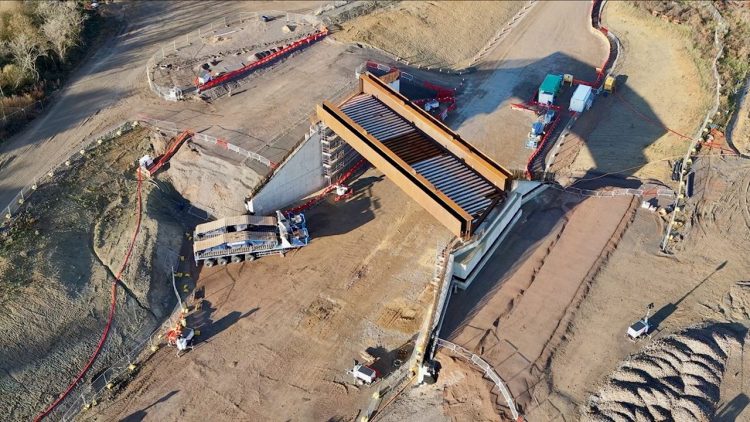HS2 engineers made use of a gigantic 600-tonne crane in order to lift the bridge into its position just north of Aylesbury.
The deck of the bridge weighs the equivalent of 25 double-decker buses and will see East West Rail services connect Oxford, Bicester, Bedford and Cambridge over a route which had mostly been closed during the 1960s.
HS2 intends to support north-south rail services and the boosting of the economy whilst providing zero-carbon rail travel. The vast project is largely underway and is providing over 29,000 jobs.
Both the earthworks and bridges over this short section which sees the two project cross are being constructed by HS2 contractors in order to provide the most efficient approach and cut overall disruption for local residents.

Welcoming the milestone, Beth West, EWR CEO said: “Local communities are now one step closer to enjoying the benefits of a new faster, more sustainable and affordable way to travel between all the communities from Oxford to Cambridge – and on across the country. East West Rail will connect thousands of people to jobs, families and friends with a reliable and safe service. The bridge installation over the Calvert cutting is a really important milestone in bringing EWR to life.
“The Government recently recommitted to East West Rail and construction of the stretch of railway between Bicester and Bletchley is being delivered as planned – both on time and on budget with passenger services between Oxford and Bletchley set to be operational from 2025.”
The bridge near Calvert weighs a massive 315 tonnes and was assembled on site before being lifted into place by HS2’s main works contractors EKFB which is made up of Eiffage, Kier, Ferrovial Construction and Bam Nuttall.
The 35m long bridge is made from weathering steel and will age naturally over time creating a dark brown shade which will mirror the tone of the surrounding countryside. The lifting of the bridge took place over a two-hour period and involved a 600-tonne crawler crane.
HS2 Ltd’s Senior Project Manager Paul Marshall said: “HS2 will transform journeys between London, Birmingham and the major cities of the north but it’s vital that we also maintain and enable links for communities on either side of the line. That’s why we have been working closely with East West Rail to get this crucial bridge into position and I’d like to thank everyone involved in getting us to this important moment for both our projects.”
Work began on the 2.1-mile cutting which is one of the longest for the HS2 project, earlier in 2022 and will enable the line south past the Buckinghamshire village of Calvert Green and Steeple Claydon generally following the route of the disused Great Central Railway which was also closed during the 1960s.
Approximately 685,000 cubic metres of material will be removed in order to create the Calvert cutting which will be around 9.7m in depth and wide enough to provide extra lines for local railways next to the HS2 main line in the future.
Further to the bridge, HS2 will also put in place 650,000 cubic metres of earthworks, two smaller road bridges as well as a footbridge for East West Rail in the Calvert area. East West Rail took over the first section of earthworks recently.
EKFB Project Director, Dave Newcombe, said: “The Calvert area is home to an important interface between two new railway networks which will see HS2 running underneath the East West Rail line. The build of this intersection, carried out by EKFB, was clearly thought out with our local communities at the forefront of our plans. To reduce disruption for residents, achieve maximum delivery efficiency and reduce costs, EKFB carried out the earthworks and the build of the new bridge for East West Rail. Now, we’re pleased to be able to lift the structural steel platform onto the bridge – a great milestone for our construction programme.”






Responses
What a surprise common sence has finaly returned in reusing the Great Central Railway track bed
That is a discusting and a very cheap and tacky bridge that they have built there what has this country really been reduced too we used to make things of pure quality and now look at us we carnt make anything good anymore what so ever absolutely shite.
A very sensible place to build an interchange station, which is therefore not what they will do